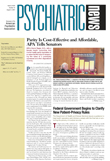To dispel some of the confusion surrounding the federal patient-privacy rule approved by the Bush administration in April, the Department of Health and Human Services (HHS) issued the first in a series of interpretive guidelines last month.
“This is a first step in helping physicians, health care providers, and health plans understand their obligations to patients under the rule,” stated HHS Secretary Tommy Thompson in a July press release.
The goal is to help these entities comply with the complex rule by April 14, 2003, according to Thompson.
The patient privacy rule was issued last December by the Clinton administration (Psychiatric News, May 5).
The guidance answers common questions about the new protections for patients and requirements for doctors, hospitals, health care providers, health plans, health insurers, and health care clearinghouses, states the HHS release.
It also clarifies some of the confusion regarding the meaning of key provisions in the rule. For example, contrary to early suggestions, hospitals do not have to build soundproof rooms to prevent conversations about a patient’s condition from being overheard. “Rather, the rule simply requires that hospitals provide reasonable safeguards to protect confidential information such as curtains, screens, or similar barriers, which are often already used,” according to the release.
The guidance also indicates that the rule allows a friend or relative to pick up a patient’s prescription at a pharmacy.
Many key issues of concern raised by APA and others are covered in the guideline. Topics in the guidance include patient consent, parental rights, marketing, medical research, and governmental access to patient information.
Thompson reiterated his intent to propose changes to the rule “to ensure that it doesn’t adversely affect a patient’s access to quality health care.”
An example he cited in the release was ensuring that a pharmacist can fill a phoned-in prescription for a new patient without having the patient’s written consent on file.
According to a July 7 article in the Washington Post, Thompson has also indicated that he plans to make it easier for physicians to refer patients to specialists.
However, Thompson has not indicated whether he plans to change the controversial marketing provisions. For example, the rule allows doctors and pharmacists to send marketing materials to patients on behalf of another business, such as a pharmaceutical manufacturer, according to the Post article. APA expressed concern repeatedly about this provision in its comment letters to HHS.
APA’s Division of Government Relations is now analyzing the guidance in detail. Further information is available by contacting Nancy Trenti at
[email protected].
The guidance is posted on the Web at www.hhs.gov/ocr/hipaa. An HHS fact-sheet summarizing the rights and protections granted under the patient privacy rule is posted at www.hhs.gov/news/press/2001pres/01fsprivacy.html. ▪
